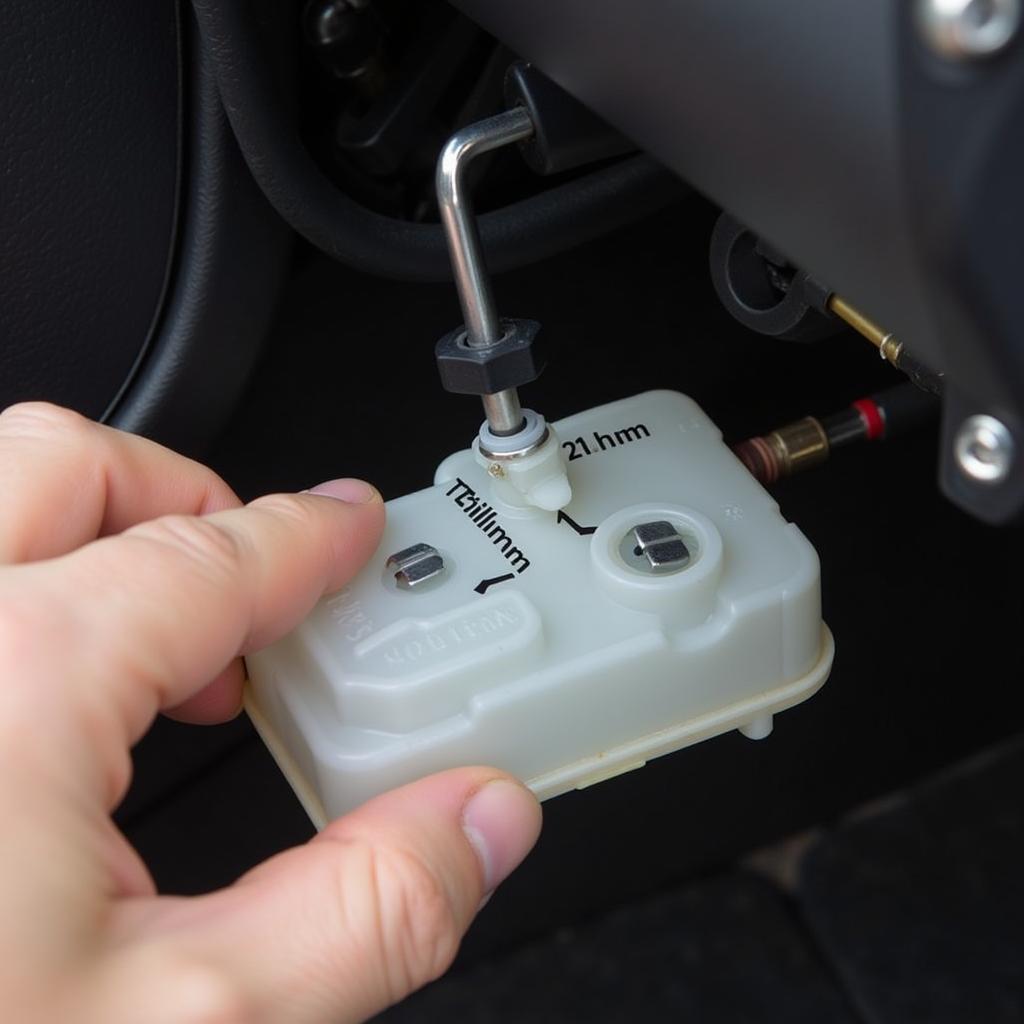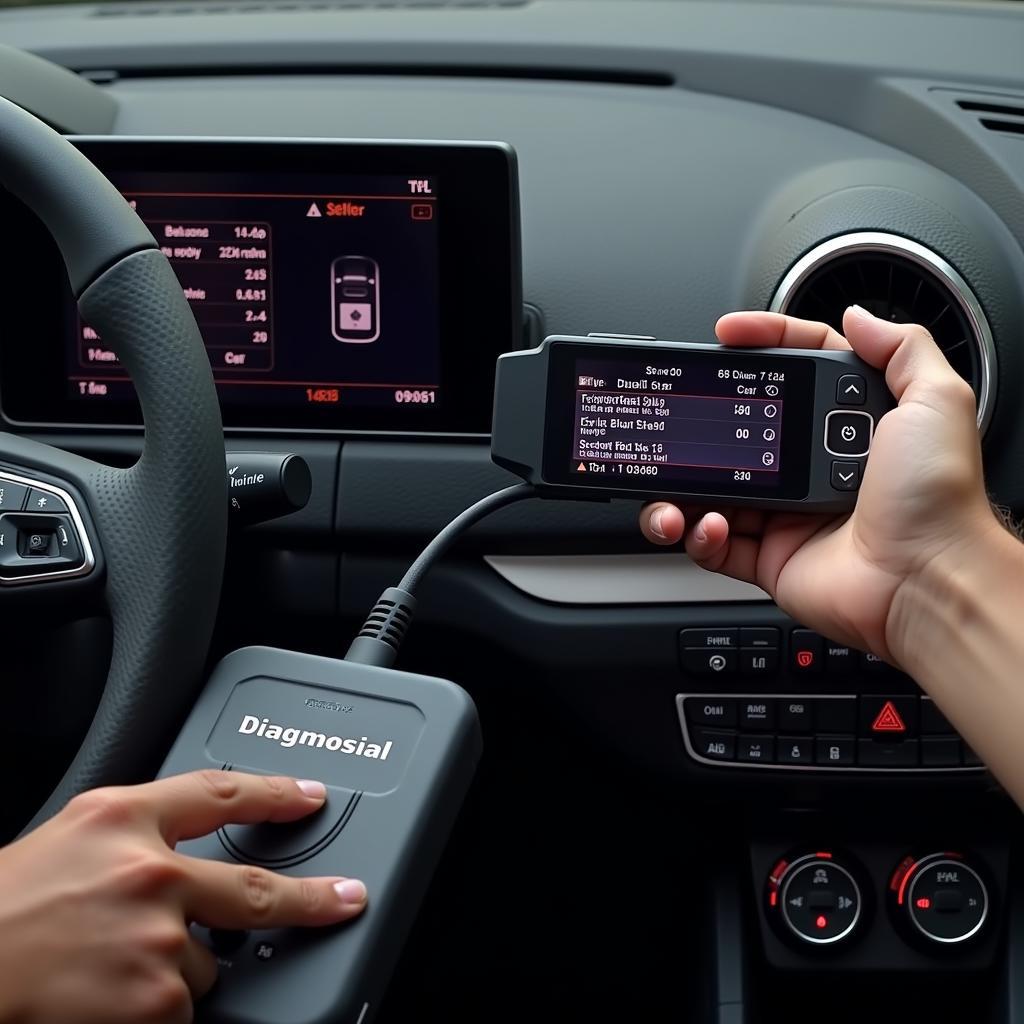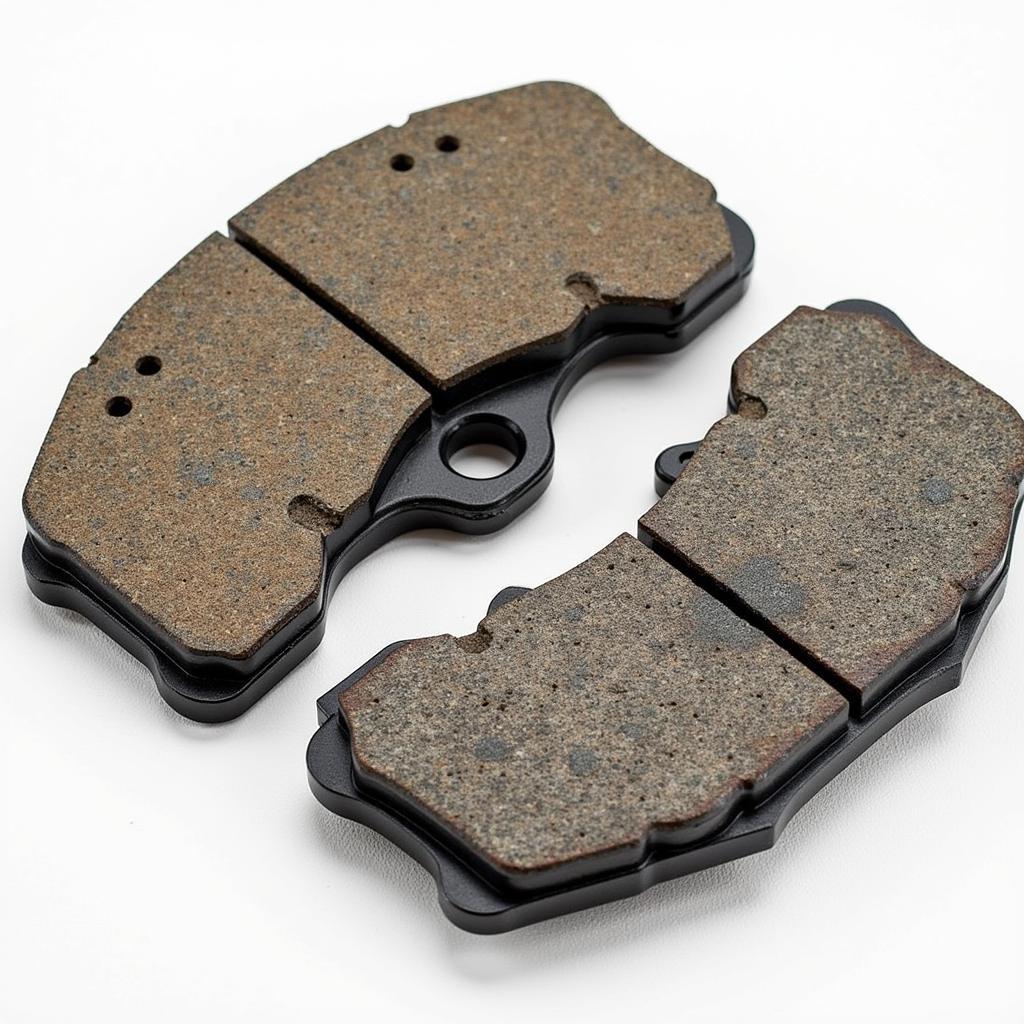The dreaded Audi A3 parking brake warning light can be a frustrating experience. Whether it’s a persistent glow or an intermittent flicker, this warning signal indicates a potential issue with your parking brake system that needs attention. This article provides a comprehensive guide to understanding, troubleshooting, and resolving the Audi A3 parking brake warning.
As a specialist in automotive electrical engineering, focusing on remote diagnostics, programming, and software installation for vehicle repairs, I often encounter this issue. Understanding the potential causes can save you time and money. Let’s dive into the common reasons behind this warning light and what you can do about it.
The parking brake warning light is designed to alert you to a problem within the braking system. This could be a mechanical or electrical fault. Ignoring it could lead to further damage and compromise your safety. See our guide on the red brake warning light audi a3 for more details on brake warning light variations. Understanding the underlying cause is crucial for effective troubleshooting.
Common Causes of the Audi A3 Parking Brake Warning
Several factors can trigger the parking brake warning light in your Audi A3. Here are some of the most common culprits:
- Low Brake Fluid: This is often the simplest explanation. The brake fluid reservoir might be low, triggering the warning light.
- Worn Brake Pads: Worn brake pads can also activate the warning light, indicating it’s time for a replacement.
- Faulty Parking Brake Switch: A malfunctioning parking brake switch can send incorrect signals to the car’s computer, illuminating the warning light.
- Wiring Issues: Damaged or corroded wiring within the parking brake system can disrupt communication and trigger the warning.
- ABS Issues: Problems with the Anti-lock Braking System (ABS) can sometimes also activate the parking brake warning light.
- Brake Caliper Problems: Sticking or seized brake calipers can prevent the brakes from releasing fully, triggering the warning light.
Troubleshooting the Parking Brake Warning Light
Now that we understand the potential causes, let’s explore how to troubleshoot the problem:
- Check the Brake Fluid Level: Open the hood and locate the brake fluid reservoir. Ensure the fluid level is within the recommended range.
- Inspect the Parking Brake Lever: Make sure the parking brake lever is fully released. Sometimes a slightly engaged lever can trigger the warning.
- Test the Brake Pedal: Feel for any unusual softness or sponginess in the brake pedal, which could indicate a brake fluid leak or other issues. You may also find the guide on lexus is250 brake warning light helpful for comparison.
 Checking Audi A3 Brake Fluid Level
Checking Audi A3 Brake Fluid Level
Using Diagnostic Tools for Advanced Troubleshooting
For more complex issues, diagnostic tools can pinpoint the exact problem. These tools can read error codes stored in the car’s computer, providing valuable insights. For further reading on Audi brake warning lights, check out brake warning light audi.
Solutions for Common Parking Brake Warning Issues
Depending on the diagnosed problem, here are some common solutions:
- Top Up Brake Fluid: If the brake fluid is low, top it up to the recommended level. Use the correct brake fluid type specified for your Audi A3.
- Replace Brake Pads: Worn brake pads should be replaced immediately to ensure optimal braking performance and safety.
- Repair or Replace the Parking Brake Switch: A faulty parking brake switch will need to be repaired or replaced.
- Address Wiring Issues: Damaged or corroded wiring needs to be repaired or replaced by a qualified technician.
- Fix ABS Issues: If the problem lies within the ABS system, it requires professional diagnosis and repair.
 Performing a Diagnostic Scan on an Audi A3
Performing a Diagnostic Scan on an Audi A3
“A simple brake fluid top-up can often resolve the parking brake warning,” says John Smith, a seasoned automotive electrician with over 20 years of experience. “However, persistent warnings require professional diagnosis to avoid further complications.”
Conclusion
The Audi A3 parking brake warning light should never be ignored. Addressing the issue promptly can prevent further damage and ensure your safety. By understanding the common causes and following the troubleshooting steps outlined in this article, you can resolve the problem efficiently. However, for complex issues, seeking professional help from a qualified technician is always recommended. Remember, a properly functioning parking brake is crucial for safe and reliable vehicle operation. Don’t forget to also check our resource on the audi a3 8l brake warning light for model-specific information.
FAQ
- What does the Audi A3 parking brake warning light look like? It’s typically a red exclamation mark or a “P” symbol inside a circle.
- Can I drive with the parking brake warning light on? It’s not recommended. While driving short distances might be possible, persistent warnings indicate a problem that needs addressing.
- How much does it cost to fix the Audi A3 parking brake warning? The cost varies depending on the underlying cause, ranging from a simple fluid top-up to more expensive repairs.
- How often should I check my brake fluid level? Checking your brake fluid level at least once a month is good practice.
- What type of brake fluid does my Audi A3 use? Consult your owner’s manual for the specific brake fluid type recommended for your model. Check our guide on the parking brake warning light audi a3 for more specific details.
- Can a low battery cause the parking brake warning light to come on? While unlikely, a severely low battery can sometimes cause erratic warning light behavior.
- Is it safe to replace brake pads myself? If you have mechanical experience, you can replace brake pads yourself. However, for those unfamiliar with the process, seeking professional help is recommended.

